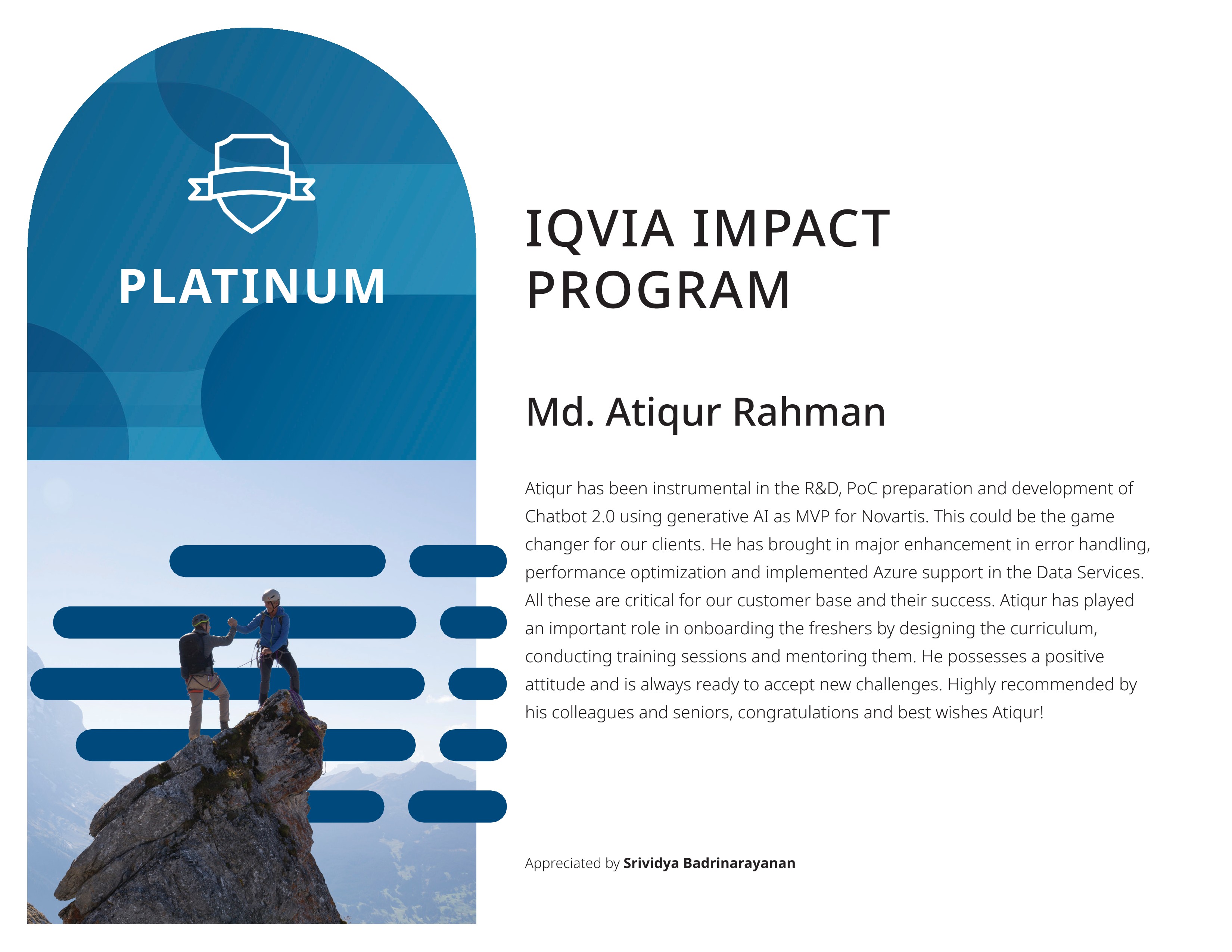Md Atiqur Rahman
I am currently pursuing a PhD in Computer Science at North Carolina State University (NCSU). Here, I have joined the Wolfpack Security and Privacy Research (WSPR) Laboratory and advised by Dr. Alexandros Kapravelos. My current research focuses on Software Supply Chain Security, with additional interests in Software Engineering and the applications of Generative AI.
Before joining NCSU, I worked as a Software Engineer at IQVIA, where I explored the industrial applications of Large Language Models (LLMs) in R&D projects. I completed my undergraduate in Computer Science and Engineering from Bangladesh University of Engineering and Technology. As part of my undergraduate thesis, I worked with Dr. A. B. M. Alim Al Islam, in the field of Computational Criminology. To view my publications, please visit my Google Scholar profile.
I also have a keen interest in CTF and Bug Bounty competitions. I engage in these activities occasionally to sharpen my skills and connect with the cybersecurity community.
Education
North Carolina State University
Advisor: Dr. Alexandros Kapravelos
Bangladesh University of Engineering and Technology
CGPA: 3.69/4.00
Notre Dame College, Dhaka
GPA: 5.00/5.00
Government Laboratory High School, Dhaka
GPA: 5.00/5.00
Publications
Cri-Astrologer: Predicting Demography of Involved Criminals based on Historical Data
With the rapid advancement in computer technology, law enforcement agencies now have access to vast databases containing detailed information about crimes. These databases enable the analysis of crime patterns, characteristics of criminals, and the demographics of both offenders and victims. By applying machine learning techniques to these datasets, we can create decision-support systems to aid police investigations. When dealing with a large volume of data, we can also employ data-driven deep learning methods. In this study, our main goal is to develop a tool for use in standard investigations. We've designed a deep factorization machine-based deep neural network (DNN) to predict criminal demographic profiles based on crime evidence and victim demographics. We assess the performance of our approach in comparison to traditional and other deep learning methods, sharing our findings in a comprehensive study.
Methods: Data Analysis and Preprocessing, Feature Engineering, Exploration of Open-source Deep Learning AlgorithmsConference: NSysS '22: Proceedings of the 9th International Conference on Networking, Systems and Security
WORK Experience
Software Engineer
At IQVIA, I worked primarily with the Data Service team and the GenAI team within Tech Analytics. My role involved managing and improving our C# .NET framework repositories, focusing on tasks such as bug fixing, enhancing codebase quality, and developing or modifying API endpoints. I actively collaborated with team members through code reviews and ensured robust software development practices.
I gained extensive experience working with both relational and NoSQL database systems, including MSSQL, Snowflake, Firebolt, Oracle, PostgreSQL, Amazon Redshift, and MongoDB. In addition, I utilized cloud platforms like Kubernetes, Azure, and AWS to optimize data operations. To ensure high-quality deliverables, I developed unit tests and Behavior-Driven Development (BDD) tests using Gherkin language.
Beyond these responsibilities, I led R&D initiatives to improve database query performance, reduce query counts, and explore cost-efficient solutions. This included evaluating new database management systems, such as Amazon Redshift, to meet diverse client needs. My contributions in the Data Service team played a key role in advancing technical capabilities and delivering high-quality data management and analytics solutions at IQVIA.
Research Experience
Longitudinal Analysis of Permissions in Node.js
I am currently investigating the evolution of permission usage in the Node.js ecosystem, focusing on how dependency changes over time impact the attack surface. This research involves developing metrics to quantify the attack surface based on permission usage and designing methods to reduce it through fine-grained permission restrictions. The goal is to enhance security practices within the npm ecosystem by providing actionable insights and strategies for minimizing vulnerabilities.
Gen-AI Enhanced Data Visualization
During my time with the GenAI team at IQVIA, I was deeply involved in an R&D project focused on transforming user interactions with data visualization. The project aimed to simplify complex dashboard configurations by integrating large language models (LLMs) into the user interface. This innovation enabled users to ask natural language queries, with the LLM generating insights and dynamically creating charts, delivering an intuitive and seamless user experience.
As part of this initiative, I explored various LLMs, including GPT, Llama, and Mistral. I worked extensively with AWS services such as Amazon Lex, Amazon SageMaker, and AWS Lambda, integrating them into the solution. Additionally, I designed interactive UI applications using the Chainlit framework in Python. To further enhance performance, I investigated optimization techniques, including streaming, pattern matching, and fuzzy matching.
Recognition
I have been honored with the Platinum Tier Impact Awards, a prestigious recognition within IQVIA, in acknowledgement of my significant and impactful contributions.

Skills
Personal Interests
Aside from academic pursuits, I have an ardent passion for travel, reveling in exploring new destinations and immersing myself in diverse cultures. Additionally, I find joy in the culinary arts, particularly cooking, while indulging in hobbies such as watching anime and reading books.